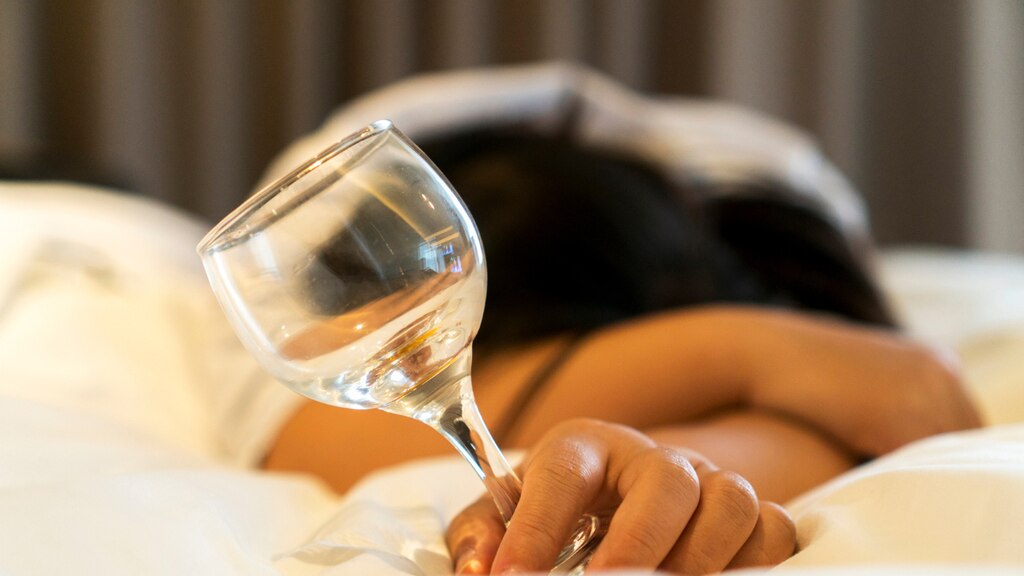
Alcohol and sleep are not compatible, 75 per cent of alcohol drinkers wake too early and 69 per cent struggle to stay asleep. Image: iStock.
You may not want to read this article as we approach the silly season, but you should, and you will hopefully thank yourself later for doing so.
Here I will answer the top seven questions I’ve been asked on the topic, from ‘is one drink ok?’ To ‘why do I wake up at 4am after drinking?’ And ‘what does alcohol actually do?’
It is important to note that what you do with this information is entirely up to you. You can use it as motivation to embark on a sober silly season, or save it for your 2023 New Year’s resolutions.
In any case, bookmark this article if not for yourself, then for someone else you know.
1. Is one drink ok?
Ah, the classic ‘is just one drink ok?’ question. Before answering that, we need to establish is it really just one drink?
If it’s a cocktail, that’s one and a half drinks, and if it’s a large glass of wine or beer, that’s probably over one drink too.
Not meaning to nit-pick, but if we are assessing if one drink is actually ok, we need to be sure that we are drinking just that, one standard drink. And for the record, that’s 30 ml of a spirit, 100 ml of wine or 285 ml of full-strength beer.
Does one standard drink: does it affect our sleep? Yes, sorry to say, it does. As noted in a 2018 study in JMIR Mental Health, sleep quality decreases by nine per cent after just one or two drinks.
While this may seem marginal, for anyone already struggling with sleeping problems, this can cause major havoc.
2. Why do I wake up around 3 am?
The most likely reason is the rebound effect, describing the nervous system’s ‘rebound’ from the depressive effects of alcohol. This occurs when alcohol starts to leave the body, and our body is attempting to return to homeostasis (equilibrium).
In order to do so, there is typically an overexaggerated spike in the awakening hormone cortisol, which usually rises naturally around 3 am. Thus, if you are experiencing the rebound effect, you’re even more likely to wake up at this time.
3. Why do I keep waking up, especially around 4, 5 and 6 am?
Recurrent nighttime wakings are due to the suppressive effects of alcohol too. However, this time, it’s due to the impact on a deep sleep stage called REM. which occurs in the latter part of the evening (the last third).
This is exactly why you wake around 4, 5 or even 6 am as we move through our sleep cycles. Each time we reach the point we usually go into REM sleep, if there is alcohol present in our system, we will be limited in our ability to do so.
Instead, the body will return to a lighter sleep stage, and often, wake up shortly after.
The other reason you may wake up is due to alcohol’s suppression of REM sleep stage, a deep sleep stage occurring in the latter third of the evening, usually responsible for emotional regulation and judgement.
4. How does alcohol affect sleep?
As mentioned, alcohol impairs REM sleep, reducing sleep depth, increasing nighttime wakings and understandably, leading to fatigue upon waking.
A 2019 academic paper reflects this, reporting that 75 per cent of alcohol drinkers wake too early and 69 per cent struggle to stay asleep. Further, high levels of alcohol can reduce slow wave activity in non-REM sleep, which reduces sleep depth and contributes to fatigue.
Given that deep sleep, both non-REM and REM sleep is critical for restoration, this is a second reason why after a boozy night out, you feel so mentally and physically exhausted.
5. Why does my partner (or I) snore after alcohol?
Alcohol relaxes the muscles around the airways, limits airflow and causes the throat to vibrate which results in the snoring sound you hear rumbling out of your partner (or yourself) after a big night out. As well, alcohol dehydrates you, which may also increase snoring too.
6. Is it better to drink in the afternoon?
A 2013 paper by Sleep Health Foundation specifies keeping at least four hours between your last drink and bedtime, based on the assumption this will render you alcohol free by the time you drift off to sleep.
This is also based on moderate drinking, not excessive drinking, as every standard drink takes approximately one hour to be eliminated from the body.
7. For our best night sleep, how can we manage alcohol?
Avoiding alcohol is ideal for your best nights sleep, as even one drink does harm.
Fortunately, there are many ways to achieve this. First, get inspired by others who are alcohol free, and know that if it’s possible for them, it’s possible for you.
Second, get amongst alcohol-free drinks which are perfect for the Christmas bbq.
Third, commit to a health kick, including a booze ban and get support from a coach to see it through. Lastly, know that by doing all of this, you won’t only feel better, but you’ll sleep better too.
Originally featured on Body and Soul
+ show Comments
- Hide Comments
add a comment